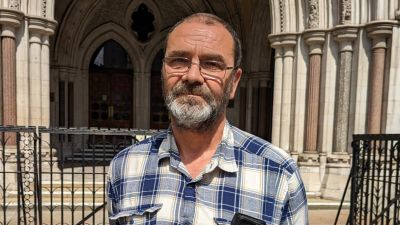Andrew Malkinson's appeal against Salford rape conviction will not be opposed, CPS confirms

Prosecutors say they will not oppose an appeal by a man who served 17 years behind bars for a rape he says he did not commit.
Andrew Malkinson, 57, was found guilty of the 2003 attack on a woman in Little Hulton, Salford, despite there being no DNA evidence linking him to the crime.
He was jailed for life in 2004 with a minimum term of seven years, but remained in prison for a further 10 years because he maintained he was innocent.
Mr Malkinson, who is originally from Grimbsy, is bidding to clear his name after new DNA evidence emerged pointing to another potential suspect.
His case was referred to the Court of Appeal in January by the Criminal Cases Review Commission (CCRC), which investigates potential miscarriages of justice, after the new evidence was discovered.
Greater Manchester Police (GMP) and the Crown Prosecution Service (CPS) have now confirmed they will not be contesting Mr Malkinson’s appeal in July.
The court still has to determine the outcome and scope of the appeal.
In a statement, Mr Malkinson said: "I’ve suffered incalculably for the last 20 years as a result of my wrongful conviction, and I continue to suffer each day.
"I have always known I am innocent. Finally, the prosecution has acknowledged my conviction should not stand.
"Of course, it is still the Court of Appeal’s decision to grant me justice. I sincerely hope they will give serious consideration to the disclosure failures which denied me a fair trial.
"The police must be made accountable – no one should have to suffer what I’ve been through."
Confirming the decision, a CPS spokesperson said: "After reviewing new DNA evidence after the CCRC made its referral in 2023, the Crown Prosecution Service has agreed that the conviction of Mr Malkinson is no longer safe.
"Therefore, the CPS will no longer contest his appeal.
"A decision to overturn a conviction is a matter for the Court of Appeal."
The spokesman said the CPS would not comment further until after Mr Malkinson’s appeal hearing, which is due to take place at some point in the two weeks after July 17.
A GMP spokesman said: "Greater Manchester Police can confirm that, in conjunction with the Crown Prosecution Service, a decision has been taken not to contest the appeal from Mr Malkinson.
"It would be inappropriate to comment in any detail until the conclusion of the Court of Appeal hearing."
While his main ground of appeal is the fresh DNA evidence, Mr Malkinson's lawyers told the court at a preliminary hearing there were photographs of the victim’s hands, corroborating her evidence that she scratched her attacker and broke a nail, which were not disclosed at the time of Mr Malkinson’s trial.
They also said there is evidence that one of the key identification witnesses was a "long-term user of heroin", which may have affected his memory, but that was not known by Mr Malkinson or his legal team at trial.
Emily Bolton, Andrew’s solicitor at Appeal, a charity and law practice which focuses on miscarriages of justice, said: "This is a major milestone in Andy’s quest for justice.
"The CPS – which nearly two decades ago prosecuted Andy – has accepted that his conviction should be overturned.
"However, it is for the Court of Appeal to decide whether to rule Andy’s conviction unsafe and, if so, on what basis.
"Andy’s 17 years of wrongful imprisonment were avoidable. We will be arguing that Andy’s conviction is unsafe not only in view of new DNA evidence, but because there were significant disclosure failures at his trial.
"It is important to dissect what went wrong in Andy’s case in order to protect victims of crime and prevent wrongful convictions in future."
At a preliminary hearing earlier in May, Edward Henry KC, for Mr Malkinson, told the court the CCRC was aware since 2009 that there was "crime specific" DNA which was not a match for either Mr Malkinson or the victim.
However, he said at that time the CCRC "did not consider it tipped the balance towards a referral" to the Court of Appeal.
But, in October last year, the sample was found to be a partial match for another man, who the court ordered can only be identified as "Mr B", and forensic investigations are ongoing.
Mr Malkinson previously applied twice for his case to be reviewed by the CCRC, but was turned down, eventually being released from prison in December 2020.
After his release, advancements in scientific techniques allowed his legal team, supported by legal charity Appeal, to provide new DNA analysis that cast doubt on his conviction to the CCRC.
The body then commissioned its own testing that found that DNA from the victim’s clothing matched another man on the national police database.
Greater Manchester Police confirmed in January that a man had been arrested and released under investigation in light of the new information, but no decision has yet been made as to whether he will be charged.
Want a quick and expert briefing on the biggest news stories? Listen to our latest podcasts to find out What You Need To know...